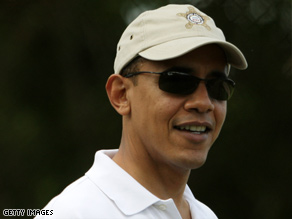Sam Youngman, The Hill: "Despite keeping Defense Secretary Robert Gates in the Pentagon, President-elect Obama's transition team informed 90 Bush appointees their services will not be needed after Inauguration Day. Scott Gration, a senior official on Obama's transition team, called and emailed several of President Bush's Pentagon appointees about 10 days ago to inform them they were being dismissed."
-

- The Guardian, Wednesday 24 December 2008
- Article history
'Tis the night before Christmas and the season of goodwill. The mood is forgiving. Our faces warm with mulled wine, our tummies full, we're meant to slump in the armchair, look back on the year just gone and count our blessings - woozily agreeing to put our troubles behind us.
As in families, so in the realm of public and international affairs. And this December that feels especially true. The "war on terror" that dominated much of the decade seems to be heading towards a kind of conclusion. George Bush will leave office in a matter of weeks and British troops will leave Iraq a few months later. The first, defining phase of the conflict that began on 9/11 - the war of Bush, Tony Blair and Osama bin Laden - is about to slip from the present to the past tense. Bush and Blair will be gone, with only Bin Laden still in post. The urge to move on is palpable.
You can sense it in the valedictory interviews Bush and Dick Cheney are conducting on their way out. They're looking to the verdict of history now, Cheney telling the Washington Times last week: "I myself am personally persuaded that this president and this administration will look very good 20 or 30 years down the road." The once raging arguments of the current era are about to fade, the lead US protagonists heading off to their respective ranches in the west, the rights and wrongs of their decisions in office to be weighed not in the hot arena of politics, but in the cool seminar rooms of the academy.
Not so fast.
Yes, the new year would get off to a more soothing start if we could all agree to draw a line and move on. But it would be wrong. First, because we cannot hope to avoid repeating the errors of the last eight years unless they are subject to a full accounting. (It is for that reason Britain needs its own full, unconstrained inquiry into the Iraq war.) Second, because a crucial principle, one that goes to the very heart of the American creed, is at stake. And third, because this is not solely about the judgment of history. It may be about the judgment of the courts - specifically those charged with punishing war crimes.
Less than a fortnight ago, in the news graveyard of a Friday afternoon, the armed services committee of the US Senate released a bipartisan report - with none other than John McCain as its co-author - into the American use of torture against those held in the war on terror. It dismissed entirely the notion that the horrors of Abu Ghraib could be put down to "a few bad apples". Instead it laid bare, in forensic detail, the trail of memos and instructions that led directly to the then defence secretary, Donald Rumsfeld.
The report was the fruit of 18 months of work, involving some 70 interviews. Most of it is classified, but even the 29-page published summary makes horrifying reading. It shows how the most senior figures in the Bush administration discussed, and sought legal fig leaves for, practices that plainly amounted to torture. They were techniques devised in a training programme known as Survival, Evasion, Resistance and Escape or SERE, that aimed to teach elite American soldiers how to endure torture should they fall into the hands of pitiless enemies. The SERE techniques were partly modelled on the brutal methods used by the Chinese against US prisoners during the Korean war. Yet Rumsfeld ruled that these same techniques should be "reverse engineered", so that Americans would learn not how to endure them - but how to inflict them. Which they then did, at Guantánamo, Abu Ghraib and beyond.
The Senate report cites the memorandums requesting permission to use "stress positions, exploitation of detainee fears (such as fear of dogs), removal of clothing, hooding, deprivation of light and sound, and the so-called wet towel treatment or the waterboard". We read of Mohamed al Kahtani - against whom all charges were dropped earlier this year - who was "deprived of adequate sleep for weeks on end, stripped naked, subjected to loud music, and made to wear a leash and perform dog tricks". Approval for this kind of torture, hidden under the euphemism of "enhanced interrogation", was sought from and granted at the highest level.
And that doesn't mean Rumsfeld. The report's first conclusion is that, on "7 February 2002, President George W Bush made a written determination that Common Article 3 of the Geneva conventions, which would have afforded minimum standards for humane treatment, did not apply to al-Qaida or Taliban detainees". The result, it says, is that Bush "opened the door" to the use of a raft of techniques that the US had once branded barbaric and beyond the realm of human decency.
For this Bush should surely be held to account. And yet there is no sign that he will, and precious little agitation that he should. A still smiling Cheney denies the Bush administration did anything wrong. Note this breathtaking exchange with Fox News at the weekend. He was asked: "If the president during war decides to do something to protect the country, is it legal?" Cheney's answer: "General proposition, I'd say yes."
It takes a few seconds for the full horror of that remark to sink in. And then you remember where you last heard something like it. It was the now immortalised interview between David Frost and Richard Nixon. The disgraced ex-president was asked whether there were certain situations where the president can do something illegal, if he deems it in the national interest. Nixon's reply: "Well, when the president does it, that means that it is not illegal."
It is no coincidence that Cheney began his career in the Nixon White House. He has the same Nixonian disregard for the US constitution, the same belief that executive power is absolute and unlimited - that those who wield it are above the law, domestic and international. It is the logic of dictatorship.
But Nixon was forced from office, his vision of an unrestrained presidency rejected. If Bush and Cheney are allowed to retire quietly, America will have failed to reassert that bedrock principle of the republic: the rule of law.
This is why there must be a reckoning. Bush will do all he can to avoid it: and it is wholly possible that one of his last acts as president will be to cover himself, his vice-president and all his henchmen with a blanket pardon. Even if that does not happen, Barack Obama is unlikely to want to spend precious capital pursuing his predecessor for war crimes.
But other prosecutors elsewhere in the world should weigh their responsibilities. In the end, it was a lone Spanish magistrate, not a Chilean court, who ensured the arrest of Augusto Pinochet. A pleasing, if uncharitable, thought this Christmas, is that Rumsfeld, Cheney and Bush will hesitate before making plans to travel abroad in 2009. Or indeed at any time - ever again.
freedland@guardian.co.uk









